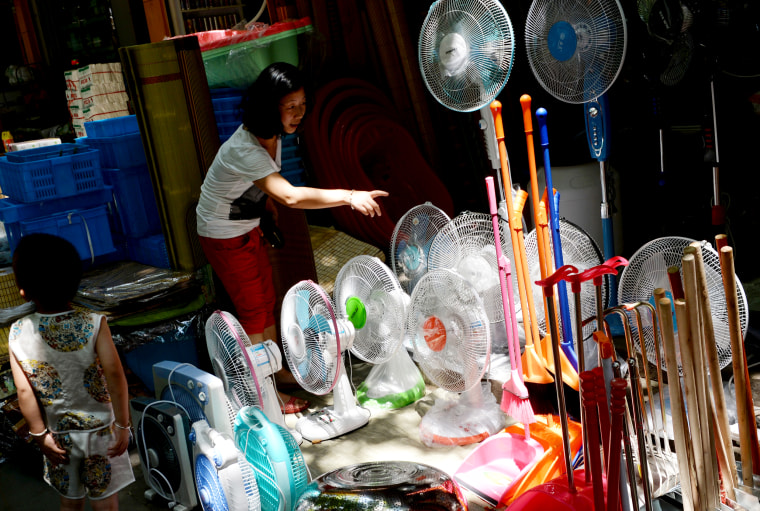To Fan Or Not To Fan, That Is The Question
"[Current guidelines for fan use are based on the] heat index [rather than the actual temperature, but] a combined value such as heat index [HI] is not appropriate for advising whether fans should be used or not."
"In very-hot dry conditions the HI was relatively lower, yet fans were detrimental; but in hot-humid conditions the HI was relatively higher and fans were beneficial."
"[That] means that the heart has to do extra work to maintain blood pressure because as one gets hot, blood is diverted to the skin to facilitate cooling and the heart must beat more times per minute." "Another form of strain [on the body] is dehydration, which also contributes to increases in body temperature and cardiovascular strain."
Ollie Jay, associate professor, faculty of health sciences, direct or, Thermal Ergonomics Laboratory, University of Sydney, Australia
"The [heat index], a unified weather metric used widely in summer forecasts, expresses the combined effects of temperature and humidity, but its utility for recommending fan use may be low."
"A very hot day with low humidity may yield a lower [heat index] than a slightly cooler but much more humid day."
Dr.Nathan B. Morris, Thermal Ergonomics Laboratory, University of Sydney, Australia
"[The new study] is very interesting. There are some significant take-aways: People in hot, humid conditions tend to do better with a fan."
"In situations where air conditioning is not possible, this means people would do better with a fan than nothing at all."
"In a dry environment, the fans just push more warm air toward you."
Dr.Matthew Levy, associate professor of emergency medicine, Johns Hopkins School of Medicine
 |
A new study highlights some fairly interesting insights into cooling the human body during increasingly common extreme heatwaves. The real takeaway from this study's conclusion on the usefulness of fans to cool down during heatwaves appears to be that when temperatures are extremely high with low humidity, use of fans in fact make one feel hotter and in the process strain on the heart is increased, and the body's core temperature is raised.
Published in the Annals of Internal Medicine, the study's senior author Dr. Jay points out that guidelines for fan use are based not on the actual temperature but rather the "heat index". Researchers recruited a dozen men, none of whom were on any kind of medication, and with no medical conditions that could affect their capacity to thermoregulate. The men were put to four two-hour sessions on random days.
Asked to be seated in a climate chamber simulating either very hot dry conditions or hot humid conditions, the tests commenced.The study subjects' temperature was measured rectally. Heart strain assessed with the use of three-lead electrocardiography and blood pressure. And dehydration was measured through tracking sweat. In the climatic chamber the heat index for the humid runs was higher than that for the arid runs, though the temperature was lower in the humid condition.
 |
| Shutterstock |
The results identified fan use in the humid conditions [temperature at 104F (40C) humidity at 50 percent and HI at 132.8, reduced core temperature and cardiovascular strain, improving comfort for the subjects. Arid conditions (temperature at 116.6F (47C) humidity at ten percent and HI at 114.8) core temperatures were raised with fan use, and cardiovascular strain occurred, producing discomfort from feeling hotter, though the heat index was lower than in the humid condition.
For the study, the researchers made use of pedestal fans, but Dr. Jay pointed out: "the principles are the same for a ceiling fan". Fans can be useful in promoting heat loss through evaporation of sweat, just not in a dry environment. It was pointed out that beyond age 60, people become hampered in their ability to sweat, leading the researchers to agree that repeat research should be undertaken with the study subjects more advanced in age to gain perspective of how age itself is involved in heating the human body during heatwaves.
A growing body of statistical awareness points to the greatest number of heatstroke casualties during extreme heatwaves is among the elderly, often living in isolation, without access to air conditioning, and collapsing from the undue stress of burden of physical strain on their major organs.
"Our results suggest that under environmental conditions that represent the vast majority of peak heatwaves in the United States and Europe fans should be recommended and the guidelines issued by most public health authorities are unnecessarily conservative."
"It is only when the air temperature is very high and humidity is very low that fans are detrimental, which can be seen in arid conditions such as Phoenix or Las Vegas in the US, or Adelaide in South Australia."
Associate Professor O. Jay
 |
"While fan use in very, hot but arid conditions such as the south central U.S., Middle East, and South Australia is not advisable, these study results do support fans as a cheaper and more accessible alternative to air conditioning in many areas of the U.S., Asia, South America and Europe that experience high temperatures and moderately high humidity during a heat wave."
"Our data shows that fan use is beneficial for cooling above the temperature thresholds currently advised by most public health agencies."
Dr. Ollie Jay, Thermal Ergonomics Laboratory
Labels: Cooling, Environment, Fans, Health, Heatwaves, Physical Stress

0 Comments:
Post a Comment
<< Home